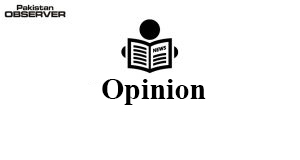Articles and letters may be edited for the purposes of clarity and space. They are published in good faith with a view to enlightening all the stakeholders. However, the contents of these writings may not necessarily match the views of the newspaper.
Unity and solidarity comes first
When Rome was burning ‘Nero’ was fiddling and consequences are known to all. Now Pakistan appears to be playing a political exhibition match in which teams will not fight for the trophy but for their personal share in gate money. Anarchy is already knocking at our doors and we are busy wasting our precious time and energy on trumping and arranging a purposeless OIC meeting right before the Pakistan Day Parade in Islamabad that once we had cancelled due to Covid-19 in the past.
Now to add fuel to fire in a highly charged situation instead of trying to resolve the issues constitutionally by maintaining peace and harmony we are threatening to mobilize workers to create ugly scenes in the streets.
OIC was formed when capitalists tried to exploit major oil resources of Muslim countries as a tool in the 1970s. It was part of the great chess game when we hosted the 2nd Islamic Summit in Lahore in 1974 that failed to serve any useful purpose for progress and welfare of suffering humanity. I pity those who are now misleading our nation to accept the forthcoming two events as important to our Muslim solidarity, while since many years OIC and others Muslim countries have not been fair in their dealing with Pakistan in times of our need.
Even on atrocities in Kashmir, or to avoid financial default they just kept some dollars in a non-checking account for short term and charged interest also, that gesture couldn’t relive IMF & FATF pressure working to weaken us economically to damage our national unity and solidarity.
I salute courage and wisdom of our two visionary leaders Mr. Hussain Shaheed Suhrawardy, who as prime minister of Pakistan did not support nationalisation of the Suez Canal by voting for Gamal Abdul Nasser action in 1956 from a British and French company because Egypt being Leader of NAM was not whole heartedly supporting Pakistan. When a newsman asked him if Pakistan will vote in favour of Egypt on the Suez Canal he said we will decide at the time of voting when pressed to express solidarity with the Arab League he immediately replied “What Arab league? ‘Zero plus Zero is equal to Zero”. Then in the recent past Moulana Shah Ahmad Noorani, a prominent leader had sarcastically questioned OIC’s credentials that according to him stand and only means “Oh I See” for Pakistanis. With this background today’s situation demands that the constitution and rule of law should be allowed to prevail against whims and caprices of all and sundry
ALI ASHRAF KHAN
Karachi
Public opinion
One cannot deny public opinion. In fact, all governments across the globe have made public opinion central plank of their policies. Just take the example of Denmark, Norway and Sweden. These countries have attained peace and prosperity just because of a vibrant public opinion at the grass root level. Citizens of these countries have the capability to make their rulers accountable if they do not deliver. Every single man is educated enough to understand affairs of the state. He expresses his confidence in a local representative through power of vote. On the whole, power of decision making about important matters of the state rests with people. This is what we call a strong public opinion.
On the other hand, in Pakistan people are left to the mercy of crooked politicians. Here, common man is not literate to know what his democratic and constitutional rights are. Public opinion is too weak to make people stand for their rights. They cannot hold their representatives accountable for their misconduct.
Making this to happen, state institutions such as free media, civil society and parliament must play their momentous role. Above all, a full-fledged education system is very vital to shape people’s imagination about government and good governance. They must get proper exposure to democracy, human rights and economic security. By this way, the country can progress. Otherwise, days ahead are bleak for Pakistanis.
ENGR MAQBOOL REKI
Quetta, Balochistan
Cyber bullying
With increased number of Internet users, Pakistan is among the top countries where cyber bullying has become rampant. The perpetrator uses technology to stalk, harass and abuse other person. Reputation attacks, trolling, online hate campaigns, account hacking all of these are a form of cyber crimes and unfortunately have become so usual that now most of the people take them lightly. Currently in Pakistan, Digital Rights foundation (DRF) is working and advocating for rights to privacy and protection of personal data of Internet users.
Now is time that DRF should upgrade their policies and improve their services, which would help to overcome increasing rate of cyber crimes, so that Internet may become a safe space for people to use. Also the DRF should impose strict punishments and heavy fines on culprits of cyber crimes. This may play a vital role in overcoming increasing cyber crime rates.
TAIBA AFZAL
Lahore










